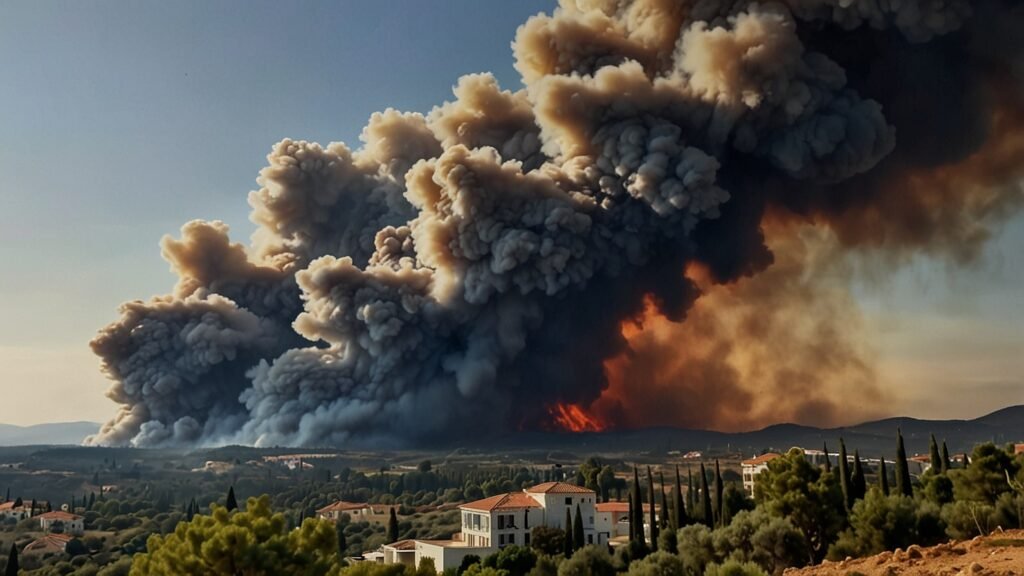
Large wildfires swept Western Greece and its islands on August 28, 2025, causing a devastating effect and displacing thousands of residents and tourists. Long heatwaves and powerful winds have caused the fires that have swept forests, villages and famous tourist spots, leading to emergency evacuations and international aid.
The fight against one of the worst wildfire seasons in the country, which Greece is currently facing, has led to heated debates on climate change, disaster preparedness, and the capacity of vulnerable communities to endure.
A Fiery Onslaught Across Western Greece
The wildfire that broke out in the Peloponnese region and several islands, including Kefalonia and Zakynthos, earlier this week quickly spread due to the high temperatures and the lack of water. As reported by the Civil Protection Agency of Greece, up to August 28, more than 50 fire lines were fanning the flames, which had burnt over 20,000 hectares of land.
Other villages like Kalyvia and Vytina were some of the worst affected, with houses burned down and animals lost to the flames. In Kefalonia, a major tourist spot, resorts had to be evacuated because fires were even nearing the shorelines, interfering with the high season of summer.
Helicopters and water-dropping planes have been busy to curb the flames, which firefighters have supported, but high winds and temperatures of over 40 °C (104 °F) have made matters hard.
The Greek government declared a state of emergency in the affected areas, mobilised additional resources, and consulted with the European Union. It has been reported that two deaths, including a firefighter and an elderly resident, have been confirmed, with dozens of injuries reported as residents fled advancing flames.
Climate Change Fuels an Unrelenting Crisis
Climate change is the reason why experts believe this wildfire season is so intense; heatwaves and droughts across the Mediterranean have been worsened by climate change. In recent years, Greece has struggled to cope with more frequent and severe wildfires, 2025 being one of the most disastrous years.
According to a recent study by the National Observatory of Athens, dry spells and record-breaking temperatures in the summer months have created tinderbox conditions, where fires spread quickly and unpredictably.
Disaster response infrastructure in Greece has also been shown to be vulnerable due to the fires. There were criticisms of a slow evacuation order by local authorities in certain areas, giving the residents very little time to evacuate.
Social media shots captured in Zakynthos depict tourists escaping beaches as smoke filled the skies, highlighting the anarchy. Environmentalists believe that the crisis has been exacerbated by decades of poor forest management and urban sprawl into wild forest fire-prone regions, and a need to develop long-term strategies to reduce risks in the future.
Evacuations and Community Resilience
The magnitude of the evacuations is huge, as more than 10,000 individuals are displaced throughout Western Greece. Peloponnesus The whole night, whole villages were evacuated with people taking refuge in schools and community centres.
Hundreds of tourists were transported to the mainland by ferry, and others were airlifted from Kefalonia to safety. The Greek Red Cross and local volunteers have been providing food, water, and blankets to affected individuals, but the number of those evacuated has overwhelmed their resources.
Resilience stories have emerged during the destruction. In Vytina, some villagers created a human chain to rescue an ancient church which was on fire and put out the fire using buckets of water. In cities such as Patras, people opened their doors to displaced people to provide them with temporary housing.
But the emotional cost is clear, and families are lamenting the loss of homes, livelihoods and beautiful scenery. This was our paradise,” said Maria Papadopoulos, a Kefalonia resident who lost her family’s olive grove. Now it was over, and we did not know where to begin again.
International Response and Recovery Efforts
There is an outcry by the international community in favour of Greece. France and Italy provided their firefighting aircraft under the EU civil protection system, and Turkey and Israel provided personnel and gear. The United Nations have released a statement about the necessity of world cooperation to solve the increased risk of climate-driven wildfires and noted that sustainable solutions are required.
Prime Minister in Athens, Kyriakos Mitsotakis, promised to restructure the affected locations, and a recovery package of EUR500m was announced as part of the efforts to offer support to victims and infrastructure restoration.
Yet, challenges loom large. The economic impact on Greece’s tourist industry, which forms the backbone of the Greek economy, is likely to be severe, and cancellations have already been reported in September. It will take years before environmental recovery can be achieved, as the process of reforestation will result in poor soils and altered ecosystems.
Scholars caution that unless climate action is taken vigorously, i.e., through the cessation of greenhouse gas emissions and improved land management, Greece and other Mediterranean countries will be subject to more frequent catastrophes.
A Call for Action Amid the Ashes
The wildfires in Western Greece are a stark reminder of the increased effects of climate change. With the country in mourning over its losses, the crisis has triggered an impetus to develop tougher environmental policies and enhance disaster preparedness.
The advice given by scientists is to implement early warning mechanisms, more effective forest management, and tighter building codes in high-risk regions. In the community, there is an advocacy of education campaigns that can empower the residents with evacuation plans and fire safety knowledge.
To date, Greece is on high alert, and it is assumed that its weather will continue to be hot and dry. The courage of firefighters and the unity of the communities provide hope, and the road to recovery is difficult. With the world watching, the fires of 2025 serve as a stark reminder that the world must directly address climate change to leave future generations with a cleaner and healthier planet.

